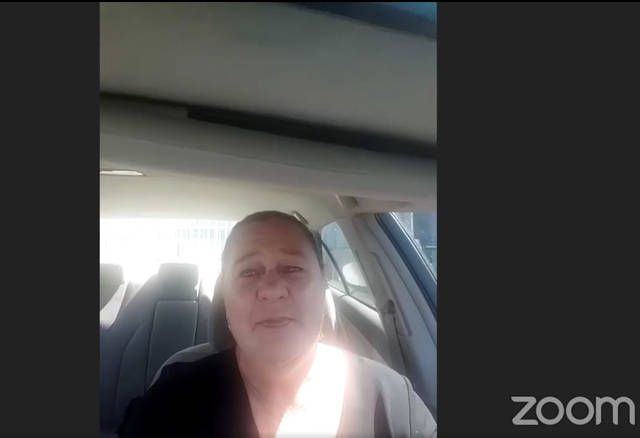
During a Zoom media conference announcing a seven-year-old lawsuit to increase state funding for public education, Wilkes-Barre resident and lawsuit member Tracey Hughes discusses her son’s struggles when he attended Wilkes-Barre Area School District. The suit has gone on so long her son graduated high school.
Screenshot
Click here to subscribe today or Login.
The wheels of justice turned so slowly that Tracey Hughes’ son has graduated from Wilkes-Barre Area School District, but she still voiced staunch support for a lawsuit alleging inadequate public education state funding, a suit that after seven years has been given a tentative court date.
The coalition of school districts (including Wilkes-Barre Area) advocates and individuals like Hughes who signed onto the case in 2014 held a virtual media conference Friday to call attention to the historic achievement of getting a court date, tentatively set at Sept. 9, for a case contending the Pennsylvania Legislature in Harrisburg has been violating a state Constitutional requirement to adequately and fairly fund public school districts.
Two other lawsuits making a similar accusation failed to garner support of judges in past decades, primarily because judges determined there was no way to determine what adequate funding is. That equation changed when the state did two things: It began administering standardized tests in grades 3-11 while setting “proficiency standards in those tests, and it did a “costing out” study to determine how much each district would need to meet those test standards, creating and adopting a formula for equitable distribution of state money.
But the formula has only been applied to “new money” added to the state budget since the formula was adopted. Currently, that means only about 11% of all state education funding is allotted through the formula. Most districts continue to get money based on the allocation system prior to the formula being adopted in 2016.
Failing to fully adopt the formula, and to provide an estimated $4.6 billion more annually to meet the state standards, has created steep inequities among school districts, the suit contends, with wealthier districts able to afford to provide a much better education opportunity than poor once.
Wilkes-Barre Area is one of six districts signed on to the suit, and Hughes is one of five parents.
“My son attended schools in the Wilkes-Barre Area School District from kindergarten through 12th grade and was directly impacted by lack of funding in the district,” Hughes said. She talked of lack of heat in the buildings, outdated books that students couldn’t take home, and antiquated lab and other equipment during his years in school.
“The lack of resources and the conditions in our schools shortchanged my son and were demoralizing to him and his classmates. It sent them a message that they don’t matter, and that no one believes in them or their future. I am proud to be a part of this case because I know that it will bring about the changes we need so that students like my son all across the state can have the future they deserve.”
Education Law Center legal director Maura McInerney said more details about the case will unfold after a pre-trial conference set for June 21. She predicted the trial could last several weeks, but said “We finally can hold the general assembly accountable to the school children of Pennsylvania for the failure to provide every child in every ZIP code a quality education.”
Reach Mark Guydish at 570-991-6112 or on Twitter @TLMarkGuydish




